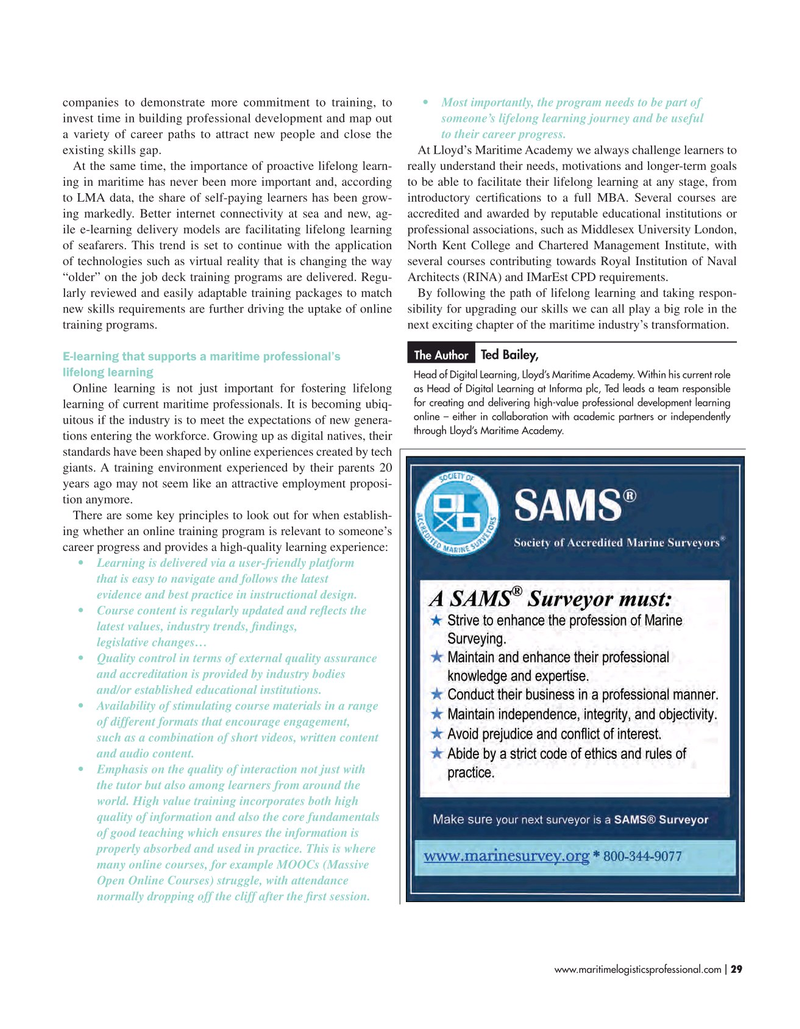
Page 29: of Maritime Logistics Professional Magazine (Sep/Oct 2019)
Energy Ports Oil-Gas-LNG
Read this page in Pdf, Flash or Html5 edition of Sep/Oct 2019 Maritime Logistics Professional Magazine
companies to demonstrate more commitment to training, to • Most importantly, the program needs to be part of invest time in building professional development and map out someone’s lifelong learning journey and be useful a variety of career paths to attract new people and close the to their career progress. existing skills gap. At Lloyd’s Maritime Academy we always challenge learners to
At the same time, the importance of proactive lifelong learn- really understand their needs, motivations and longer-term goals ing in maritime has never been more important and, according to be able to facilitate their lifelong learning at any stage, from to LMA data, the share of self-paying learners has been grow- introductory certifcations to a full MBA. Several courses are ing markedly. Better internet connectivity at sea and new, ag- accredited and awarded by reputable educational institutions or ile e-learning delivery models are facilitating lifelong learning professional associations, such as Middlesex University London, of seafarers. This trend is set to continue with the application North Kent College and Chartered Management Institute, with of technologies such as virtual reality that is changing the way several courses contributing towards Royal Institution of Naval “older” on the job deck training programs are delivered. Regu- Architects (RINA) and IMarEst CPD requirements.
larly reviewed and easily adaptable training packages to match By following the path of lifelong learning and taking respon- new skills requirements are further driving the uptake of online sibility for upgrading our skills we can all play a big role in the training programs. next exciting chapter of the maritime industry’s transformation.
Ted Bailey,
The Author
E-learning that supports a maritime professional’s lifelong learning
Head of Digital Learning, Lloyd’s Maritime Academy. Within his current role as Head of Digital Learning at Informa plc, Ted leads a team responsible
Online learning is not just important for fostering lifelong for creating and delivering high-value professional development learning learning of current maritime professionals. It is becoming ubiq- online – either in collaboration with academic partners or independently uitous if the industry is to meet the expectations of new genera- through Lloyd’s Maritime Academy.
tions entering the workforce. Growing up as digital natives, their standards have been shaped by online experiences created by tech giants. A training environment experienced by their parents 20 years ago may not seem like an attractive employment proposi- tion anymore.
There are some key principles to look out for when establish- ing whether an online training program is relevant to someone’s career progress and provides a high-quality learning experience: • Learning is delivered via a user-friendly platform that is easy to navigate and follows the latest evidence and best practice in instructional design.
• Course content is regularly updated and refects the latest values, industry trends, fndings, legislative changes… • Quality control in terms of external quality assurance and accreditation is provided by industry bodies and/or established educational institutions.
• Availability of stimulating course materials in a range of dif ferent formats that encourage engagement, suc h as a combination of short videos, written content and audio content. • Emphasis on the quality of interaction not just with the tutor but also among learners from around the w orld. High value training incorporates both high quality of information and also the core fundamentals of good teaching which ensures the information is properly absorbed and used in practice. This is where many online courses, for example MOOCs (Massive Open Online Courses) struggle, with attendance normally dropping off the cliff after the frst session. www.maritimelogisticsprofessional.com 29
I

 28
28

 30
30
